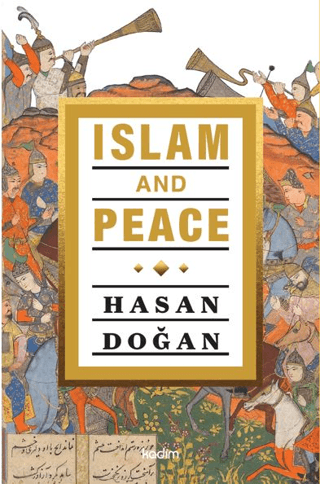Islam and Peace

The controversy among Islamic jurists over whether the natural relationship between Muslims and non-Muslims should be based on war or peace has affected the legitimacy and role of treaties in Islamic law, which is one of the leading concepts and issues in international law.
Various views have been put forward regarding the role of treaties in international relations theory of Islam, which, as clearly seen both in the practices of Quran, and the Holy Prophet (PBUH), calls for peace at every opportunity and oppose corruption, chaos, and brutality. These views include discussions about whether treaties are limited by any specific duration, under what conditions Muslims can conclude treaties, and the circumstances under which they can end them.
Islam is not a religion that fuels conflict, aims for warfare, owes its rapid expansion to violence, and has a strict attitude towards treaties and making treaties. To the contrary, it is a structure that accepts war and peace as realities of life for the sake of human tranquility and the reform of the earth, but prefers peace to violence, and has a broad perspective on being in a state of agreement. Islam has not ignored the existence and inevitability of war, violence, and conflict, but instead has revealed the precautions that need to be taken and the rules to be followed. Islam has not defined Islam as an extraordinary condition, but instead has granted great freedom to its members in concluding treaties as long as they remain true to the essence and fundamental values of Islam and observed the benefits of Islam and Muslims. Therefore, we believe that it is really normal and even necessary for Muslims to make treaties, considering the conditions of the age they live in and the benefits to be obtained as well as the need for their civilization for tranquility, development, and peace.
The controversy among Islamic jurists over whether the natural relationship between Muslims and non-Muslims should be based on war or peace has affected the legitimacy and role of treaties in Islamic law, which is one of the leading concepts and issues in international law.
Various views have been put forward regarding the role of treaties in international relations theory of Islam, which, as clearly seen both in the practices of Quran, and the Holy Prophet (PBUH), calls for peace at every opportunity and oppose corruption, chaos, and brutality. These views include discussions about whether treaties are limited by any specific duration, under what conditions Muslims can conclude treaties, and the circumstances under which they can end them.
Islam is not a religion that fuels conflict, aims for warfare, owes its rapid expansion to violence, and has a strict attitude towards treaties and making treaties. To the contrary, it is a structure that accepts war and peace as realities of life for the sake of human tranquility and the reform of the earth, but prefers peace to violence, and has a broad perspective on being in a state of agreement. Islam has not ignored the existence and inevitability of war, violence, and conflict, but instead has revealed the precautions that need to be taken and the rules to be followed. Islam has not defined Islam as an extraordinary condition, but instead has granted great freedom to its members in concluding treaties as long as they remain true to the essence and fundamental values of Islam and observed the benefits of Islam and Muslims. Therefore, we believe that it is really normal and even necessary for Muslims to make treaties, considering the conditions of the age they live in and the benefits to be obtained as well as the need for their civilization for tranquility, development, and peace.
| Taksit Sayısı | Taksit tutarı | Genel Toplam |
|---|---|---|
| 1 | - | - |
| 2 | 149,80 | 299,60 |
| 3 | 101,73 | 305,20 |
| 6 | 53,20 | 319,20 |
| 9 | 36,71 | 330,40 |
| Taksit Sayısı | Taksit tutarı | Genel Toplam |
|---|---|---|
| 1 | - | - |
| 2 | 149,80 | 299,60 |
| 3 | 103,32 | 309,96 |
| 6 | 53,20 | 319,20 |
| 9 | 36,71 | 330,40 |
| Taksit Sayısı | Taksit tutarı | Genel Toplam |
|---|---|---|
| 1 | - | - |
| 2 | 149,80 | 299,60 |
| 3 | 102,67 | 308,00 |
| 6 | 53,20 | 319,20 |
| 9 | 37,02 | 333,20 |
| Taksit Sayısı | Taksit tutarı | Genel Toplam |
|---|---|---|
| 1 | - | - |
| 2 | 149,80 | 299,60 |
| 3 | 103,60 | 310,80 |
| 6 | 53,20 | 319,20 |
| 9 | 37,02 | 333,20 |
| Taksit Sayısı | Taksit tutarı | Genel Toplam |
|---|---|---|
| 1 | - | - |
| 2 | 149,80 | 299,60 |
| 3 | 103,60 | 310,80 |
| 6 | 55,53 | 333,20 |
| 9 | 37,02 | 333,20 |
| Taksit Sayısı | Taksit tutarı | Genel Toplam |
|---|---|---|
| 1 | - | - |
| 2 | 149,80 | 299,60 |
| 3 | 94,27 | 282,80 |
| 6 | 53,20 | 319,20 |
| 9 | 37,02 | 333,20 |
| Taksit Sayısı | Taksit tutarı | Genel Toplam |
|---|---|---|
| Tek Çekim | 280,00 | 280,00 |
| 2 | 149,80 | 299,60 |
| 3 | 102,67 | 308,00 |
| 6 | 53,20 | 319,20 |
| 9 | 37,02 | 333,20 |














